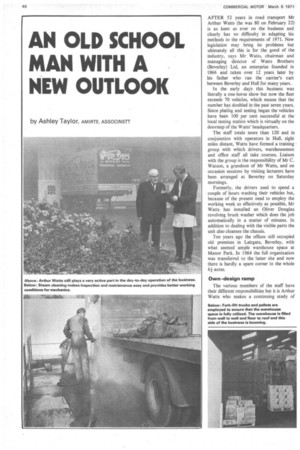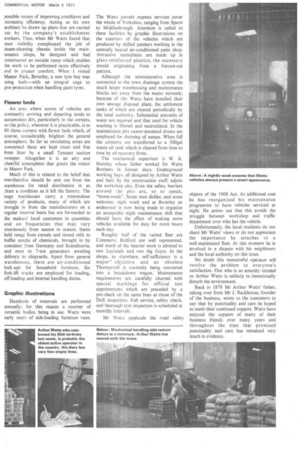by Ashley Taylor, AMIRTE, ASSOCINSTT
Page 48

Page 49

If you've noticed an error in this article please click here to report it so we can fix it.
AFTER 52 years in road transport Mr Arthur Watts (he was 80 on February 22) is as keen as ever on the business and clearly has no difficulty in adapting his methods to the requirements of 1971. New legislation may bring its problems but ultimately all this is for the good of the industry, says Mr Watts, chairman and managing director of Watts Brothers (Beverley) Ltd, an enterprise founded in 1866 and taken over 12 years later by his father who ran the carrier's cart between Beverley and Hull for many years.
In the early days this business was literally a one-horse show but now the fleet• exceeds 70 vehicles, which means that the number has doubled in the past seven years. Since plating and testing began the vehicles have been 100 per cent successful at the local testing staticin which is virtually on the doorstep of the Watts' headquarters,
The staff totals more than 120 and in conjunction with operators in Hull, eight miles distant, Watts have formed a training group with which drivers, warehousemen and office staff all take courses. Liaison with the group is the responsibility of Mr C. Watson, a grandson of Mr Watts, and on occasion sessions by visiting lecturers have been arranged at Beverley on Saturday mornings.
Formerly, the drivers used to spend a couple of hours washing their vehicles but, because of the present need to employ the working week as effectively as possible, Mr Watts has installed an Oliver Douglas, revolving brush washer which does the job automatically in a matter of minutes. In addition to dealing with the visible parts the unit also cleanses the chassis.
Ten years ago the offices still occupied old premises in Lairgate, Beverley, with what seemed ample warehouse space at Manor Park. In 19_64 the full organization was transferred to the latter site and now there is hardly a spare corner in the whole 6+ acres.
Own—design ramp
The various members of the staff have their different responsibilities but it is Arthur Watts who makes a continuing study of possible means of improving conditions and increasing efficiency. Acting as his own architect he draws up plans that are carried put by the company's establishment workers. Thus, when Mr Watts found that poor visibility complicated the job of steam-cleaning chassis inside the maintenance shops, he designed and had constructed an outside ramp which enables the work to be performed more effectively and in greater comfort. When I visited Manor Park, Beverley, a new tyre bay was )eing built—with an integral cage to ;ive protection when handling giant tyres.
Flower beds An area where scores of vehicles are constantly arriving and departing tends to accumulate dirt, particularly in the corners, so the policy, wherever it is practicable, is to fill those corners with flower beds which, of course, considerably brighten the general atmosphere. So far as circulating areas are concerned these are kept clean and free from litter by a small Tennant suction sweeper. Altogether it is an airy and cheerful atmosphere that greets the visitor to Manor Park.
Much of this is related to the belief that merchandise should be sent out from the warehouse for retail distribution in as clean a condition as it left the factory. The huge warehouses carry a tremendous variety of products, many of which are brought in from the manufacturers on a regular interval basis but are forwarded to the makers' local customers in quantities and on frequencies that may vary enormously from season to season. Items held range from cereals and tinned milk to buffer stocks of chemicals, brought in by container from Germany and Scandinavia, and even to 7-ton generators awaiting delivery to shipyards. Apart from general warehouses, there are air-conditioned lock-ups for household furniture. Six fork-lift trucks are employed for loading, off-loading and internal handling duties.
Graphic illustrations Hundreds of removals are performed annually; for this reason a number of versatile bodies being in use. Watts were early users of side-loading furniture vans. The Watts parcels express services cover the whole of Yorkshire, ranging from Spurn to Middlesbrough. Attention is called to these facilities by graphic illustrations on the exteriors of the vehicles which are produced by skilled painters working in the centrally heated air-conditioned paint shop. Attractive nameplates are made up in glass-reinforced plastics, the necessary mould originating from a fretsaw-cut pattern.
Although the administrative area is connected to the town drainage system the much larger warehousing and maintenance blocks are away from the mains network; because of this Watts have installed their own sewage disposal plant, the settlement tanks of which are cleared periodically by the local authority. Substantial amounts of water are required and that used for vehicle washing is filtered and recirculated. In the maintenance pits castor-mounted drums are employed for draining of sumps. When full the contents are transferred to a 500gal waste oil tank which is cleared from time to time by oil recovery firms.
The mechanical supervisor is W. R. Huntley whose father worked for Watts Brothers in former days. Underground working bays. all designed by Arthur Watts and built by the construction staff, adjoin the workshop pits. Even the safety barriers around the pits are, so to speak, "home-made". Some men dislike, and some welcome, night work and at Beverley an endeavour is now being made to organize an acceptable night maintenance shift that should have the effect of making more vehicles available for duty for more hours each day.
Roughly half of the varied fleet are Cornmers; Bedford are well represented, and much of the heavier work is allotted to two Leylands and two big Guys. In the shops, as elsewhere, self-sufficiency is a major ' objective and an obsolete Thornycroft is currently being converted into a breakdown wagon. Maintenance requirements are carefully charted with special markings for official test appointments which are preceded by a pre-check on the same lines as those of the DoE inspectors. Full service, safety check, and thorough tyre inspection is scheduled at monthly intervals.
Mr Watts applauds the road safety
objects of the 1968 Act. At additional cost he has reorganized his maintenance programme to have vehicles serviced at night. He points out that this avoids the struggle between workshop and traffic department over who has the vehicle.
Unfortunately, the local residents do not share Mr Watts' views or do not appreciate the importance he attaches to a well-maintained fleet. At this moment he is involved in a dispute with his neighbours and the local authority on this issue.
No doubt this resourceful operator will resolve the problem to everyone's satisfaction. One who is so amenity minded as Arthur Watts is unlikely to intentionally disturb the environment.
Back in 1878 Mr Arthur Watts' father, taking over from Mr J. Backhouse, founder of the business, wrote to the customers to say that by punctuality and care he hoped to merit their continued support. Watts have enjoyed the support of many of their business friends over many years and throughout the time that promised punctuality and care has remained very much in evidence.




































































































